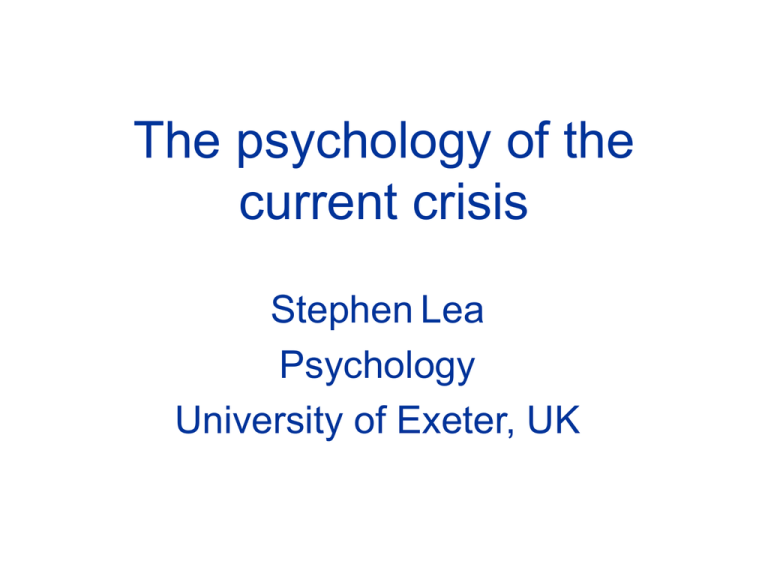
The psychology of the
current crisis
Stephen Lea
Psychology
University of Exeter, UK
Structure of the talk
1. Introduction to economic
psychology
2. Money psychology and the
recession
3. Debt psychology and the
recession
4. Macroeconomic psychology, or
what should we do next?
23rd August 2010
Stephen Lea: ICABEEP Summer
School, Moscow
2
An apology to my hosts
• Both theory and data in this talk will be
largely based on “Western” (largely UK
and US) experience
• Economic psychology is still too little
informed by material from the new and
renewed economies of the world
• But then, the crisis was itself a product
of the “Anglo-Saxon” financial world...
23rd August 2010
Stephen Lea: ICABEEP Summer
School, Moscow
3
The UK Economic and Social Research
Council’s experts on
“Dealing with the Downturn”
(Society Today, Spring 2009)
• Director of the ESRC International Centre for Life Course
Studies in Society and Health
• Research Fellow at the ESRC Centre for Economic
Performance
• CEO of Shelter (a housing charity)
• CEO of Oxfam (a poverty/internationl development charity)
• Director of the ESRC World Economy and Finance
Research Programme
• 2 academic specialists in medieval finance
23rd August 2010
Stephen Lea: ICABEEP Summer
School, Moscow
4
So has psychology nothing to
say?
• What we ought to be able to talk about:
– What individual behaviours have contributed to the present
crisis
– How the crisis will impact on people’s feelings, wishes,
thoughts, and actions
– What individual behaviours could contribute to resolving the
crisis
• The resources we have:
– 108 years of economic psychology (since Tarde, 1902)
– 53 years of behavioural economics (since Simon, 1957)
• And we’ve been here before: Katona & Strumpel
(1978)
23rd August 2010
Stephen Lea: ICABEEP Summer
School, Moscow
5
The evidential base
• So, I’m not talking about “data from recent
studies”
• But this is an evidence-based talk – based on
broad well established trends
• The evidence has been gathered over a
century of research, but the pace of work has
quickened greatly in the last 2 decades
• It represents a convergence of approach by
psychologists and economists
• But it has not yet been deployed in the
formation of policy (though see recent books
by Thaler & Sunstein; Ariely; Akerlof & Shiller;
Layard)
23rd August 2010
Stephen Lea: ICABEEP Summer
School, Moscow
6
The basic psychological /
behavioural position on the economy
• Contrary to the foundational assumptions of 20th century
theoretical economics, economic behaviour is not
completely described by rational choice models
• Deviations from rationality are systematic and substantial
• Such deviations can be predicted from known processes
in cognitive, social, comparative (and perhaps clinical,
developmental and evolutionary) psychology
• They can be studied in laboratory experiments and the
results will be predictive for the real economy
• An economics (and hence an economic policy) that does
not take account of psychological processes and data is
radically incomplete
23rd August 2010
Stephen Lea: ICABEEP Summer
School, Moscow
7
Looking for deviations from
conventional rationality
• Early work in behavioural decision
theory focused on the axioms of rational
choice e.g. transitivity. Small deviations
from rationality were found, but these
were not on a scale to cause any
concern to economic theorists
• From the 1970s on, much larger
deviations began to be studied...
23rd August 2010
Stephen Lea: ICABEEP Summer
School, Moscow
8
Three major deviations from
conventional rationality
• Heuristics, biases and social influence:
people use short cuts to take economic
decisions, including taking the views of others
into account
• Fairness, altruism and other norms: people
take the outcomes for other people into
account when making economic decisions
• Myopia: people are unsystematic in weighing
up outcomes that happen at different times,
usually greatly undervaluing outcomes in the
more distant future
23rd August 2010
Stephen Lea: ICABEEP Summer
School, Moscow
9
Two examples of research
programmes in economic psychology
• Money
– Why do we trust it, and why might we cease to
trust it?
– Why is it such a strong motivator?
– What are the limits to its use and why do they
exist?
• Debt
–
–
–
–
How do people understand debt?
Why do people get into debt?
How does being in debt affect people?
How can people get out of debt?
23rd August 2010
Stephen Lea: ICABEEP Summer
School, Moscow
10
Prolific interdisciplinarity
• Just asking these questions makes it
clear that both topics have economic as
well as psychological factors
• We also need to call on data from
sociology, anthropology, geography, and
other social sciences
• A tentative generalisation: Once you
drop some disciplinary boundaries, they
all tend to go
23rd August 2010
Stephen Lea: ICABEEP Summer
School, Moscow
11
Why a psychology of money?
• Money is an intensely strong motivating force but,
unlike other strong motivators such as food or
sex, it has no apparent or direct biological basis.
• Money is extremely effective. When nonmonetised societies encounter money-using
societies, the non-monetised start using money
and not vice versa
• Modern money is fiduciary: it works because
people trust it to work. Most people don’t
understand the basis for their trust. Trust is a
psychological and phenomenon, and it is at risk in
recessions and other economic crises.
23rd August 2010
Stephen Lea: ICABEEP Summer
School, Moscow
12
Money as tool
• Traditionally, money is seen as an instrument,
or tool
• Individuals use money to gain access to
biologically-based incentives, and this is held
to explain why they are motivated to obtain
money
• Money makes it easier to trade – it avoids the
need for a “double coincidence of wants” –
and hence to gain access to basic incentives
23rd August 2010
Stephen Lea: ICABEEP Summer
School, Moscow
13
Money as drug (Lea & Webley, 2006)
• If money is just a tool, why does it have such direct and
sometimes overwhelming effects on behaviour and
emotions?
• “Money illusion” (e.g. Shafir, et al., 1997) would not arise if
people treated money in a rational, instrumental way
• In some cases, the obvious instrumental uses of money
are socially rejected (though they may still happen), e.g.:
– Paying for sex (Zelizer, 2000)
– Buying children, or bodily organs (Roth, Shanteau)
– Giving money gifts to certain relatives, or up a status hierarchy (e.g.
Webley et al., 1983)
– Repayment for neighbourly help (Webley & Lea, 1993)
• Anything that bypasses normal instrumental processes and
directly causes pleasure or pain can be described as a
drug
23rd August 2010
Stephen Lea: ICABEEP Summer
School, Moscow
14
Money psychology and the
recession
• Money illusion has probably been important in
people’s responses to rising house prices:
• If you own a house whose price has risen, but all
prices have gone up and you still need a house, you
are not really better off; but money illusion would
make you feel better off
• If you feel better off, you are more likely to dissave, or
to enter into credit arrangements
• So while the banks are arguably to blame for allowing
people to borrow against the increased equity in their
houses, basic money psychology is probably what
led people to want to take such loans
23rd August 2010
Stephen Lea: ICABEEP Summer
School, Moscow
15
The psychology of debt
• Theoretical driver for a psychology of debt: debt is an
example of inter-temporal choice
• Saving also involves inter-temporal choice, and has
long been recognised as problematic for rationalitybased economics: people do far less of it than would
be rational (e.g. Fisher 1930), a case of Myopia
• In the 1980s, a detailed psychology of saving was
developed to account for this (see Wärneryd, 1999)
• Saving was one of the first fields in which behavioural
economics developed (Shefrin & Thaler, 1988,
behavioural life-cycle hypothesis)
• In economics, debt is treated as the mirror-image of
saving, and initially that approach was taken over into
the economic psychology of debt
23rd August 2010
Stephen Lea: ICABEEP Summer
School, Moscow
16
Credit, debt and problem debt
• In accountancy terms, any situation where
someone owes money is debt
• But psychologically, we need to distinguish
(Lea, 1999):
– Credit: borrowing agreed and under control
– Debt: money that should have been paid and has
not been, but could be (with more or less difficulty)
– Problem or Crisis Debt: money that cannot be paid
without a major change of lifestyle, and perhaps
not even then
• Viability and value of credit arrangements
tend to be assessed in terms of affordability
of repayments rather than total cost or APR
(Ranyard & Craig, 1995)
23rd August 2010
Stephen Lea: ICABEEP Summer
School, Moscow
17
Debt psychology and poverty psychology (Lea
et al., 1993, 1995; Mewse et al., in press)
• The practical drivers for our development of debt
psychology: large amounts of intractable debt to utilities &
public bodies, and growing dependence on loans in HE
(see Scott et al., 2001)
• The psychology of this kind of debt is closely linked to the
psychology of poverty, and the major explanatory factors for
debt are economic (low income, high expenditure)
• The poverty may not be absolute, but relative to a reference
group (maybe an inappropriate one)
• Financial errors are common in young adults: among those
with no family resources and poor employment prospects,
they may trigger a long career of debt and near-debt
• People in debt tend to see themselves as poor financial
managers – however...
23rd August 2010
Stephen Lea: ICABEEP Summer
School, Moscow
18
Coping strategies of poor debtors
Typical debtor behaviour can be seen as a set of
relatively successful practical and psychological
coping strategies, developed over long exposure to a
situation from which there is little prospect of escape
• Maintaining children’s appearances
• “Robbing Peter to pay Paul” – abandonment of
orderly budgeting
• Use of high-interest but no-questions-asked door-todoor lenders
• Adoption of “debtor identity”
• Belief that debt is more widespread than it is
• Smoking – the affordable luxury
• Unrealistic dreams of escape
23rd August 2010
Stephen Lea: ICABEEP Summer
School, Moscow
19
Debt psychology and the recession
Anecdotal/journalistic evidence suggests that the
recession is producing less familiar varieties of
debt:
• Unemployment / business failure leading to
sudden loss of income: debt follows if lifestyle /
reference groups not adjusted quickly enough
• Formerly affordable credit arrangements become
unaffordable
• Acute rather than Chronic debt – a research
opportunity? How will people choose between
dissaving, changing lifestyle, or taking lower
prestige jobs?
23rd August 2010
Stephen Lea: ICABEEP Summer
School, Moscow
20
Macroeconomic psychology?
• Has there been a mass psychology of
either money and debt that has
contributed to the credit crunch?
• If so, can that psychology be dismantled
or repaired?
• Would doing so help us find a relatively
benign route out of the present
economic situation?
23rd August 2010
Stephen Lea: ICABEEP Summer
School, Moscow
21
Three disastrous heuristics:
The psychology of housing boom
and bust
1. “Home ownership is always better
than renting”
2. “House price increases make home
owners better off”
3. “If you can afford the repayments, you
can afford the loan”
23rd August 2010
Stephen Lea: ICABEEP Summer
School, Moscow
22
1. Ownership and possession
• The bubble that preceded the crunch was due in part to
very high demand for owner-occupancy (1998: UK 67%,
France 54%, Germany 41%), partly politically stimulate
• There are (still) biases in the housing market that favour
owner-occupiers
• However a rational analysis would not support owneroccupancy in many sectors to whom it was being marketed,
especially in the US
• The marginal owners – the 26% who own in the UK but rent
in Germany – are those for whom ownership is least likely
to be rational
• At least some people (those high on materialism) feel that
owning makes them happy (Belk, 1984), and some of the
demand for ownership seems to have no other (“rational”)
basis (Diaz-Serrano, 2009).
23rd August 2010
Stephen Lea: ICABEEP Summer
School, Moscow
23
2. Rising house prices and the
feeling of wealth
• The sense of increased wealth among owners when
house prices rise is a case of money illusion
• However rising asset prices do give some objective
freedom:
– Easier loans when you move house
– The ability to raise loans against the increased equity
• These freedoms only work if house prices will (over any
medium or long term) never fall
• There have been times of falling prices within recent
memory (e.g. early 1990s), but most borrowers (and staff
of lending institutions) had no experience of them
• Consequently, we had no heuristics available for dealing
with a falling market (and probably still haven’t)
23rd August 2010
Stephen Lea: ICABEEP Summer
School, Moscow
24
3. The affordable loan
• People find interest rate calculations difficult, and
don’t do them
• In choosing between loans, the salient feature is the
regular (weekly / monthly) repayment; in choosing
whether to take a loan, the affordability of the regular
repayment is the key question
• This is sensible, but only in a world where nothing
can go wrong
• In many sub-prime loans, the repayments were
affordable at first but would never have been
affordable later – but here myopia comes in...
23rd August 2010
Stephen Lea: ICABEEP Summer
School, Moscow
25
MMM... Recession!
• Materialism: excess demand for house
purchase
• Money illusion: unwise decisions based
on rising house prices
• Myopia: failure to take longer-term
affordability into account
This is what needs to be dismantled
23rd August 2010
Stephen Lea: ICABEEP Summer
School, Moscow
26
Multiple causation
• Notice that every one of these trends has a
rational as well as a heuristic component
• There are also always technical issues, e.g.
people taking unaffordable loans would have
caused only personal disasters if those loans
had not been sold on as derivatives that did
not recognise their instability
• All macroeconomic effects follow from a
constellation of causes
• However people’s wishes, their incompletely
informed judgements and sometimes
misinformed feelings are always part of the
story
23rd August 2010
Stephen Lea: ICABEEP Summer
School, Moscow
27
The psychology of recovery
• The Keynesian paradox:
– In the long term, a repetition of the present crisis
can only be prevented if people save more and
borrow less
– In the short term, recovery depends on those who
can afford it being willing to spend discretionary
income
• Katona: the Better-Better group
– People are more likely to spend / dissave if they
feel their economic conditions have improved
recently and will improve in the near future
23rd August 2010
Stephen Lea: ICABEEP Summer
School, Moscow
28
The spreading effects of recession
23rd August 2010
Stephen Lea: ICABEEP Summer
School, Moscow
29
Three levels of psychological
impact in a recession
• Direct effects – due to unemployment,
business collapse etc. Loss of income and
“bereavement processes”
• Indirect effects – due to increased risk of
being directly impacted, or family / friends
losing jobs etc. Increased caution,
withdrawal from economy
• Atmosphere effects – due to media, economic
policy, etc. Escapism, conservativive
economic choices
23rd August 2010
Stephen Lea: ICABEEP Summer
School, Moscow
30
How large are the sectors?
• Typically the proportion directly affected is
quite low
• Significant numbers are immune – their
income is fixed or their employment is
unshakeable. They may well be objectively
better off in the recession
• But the boundaries are fuzzy (e.g. friends /
family of unemployed people are both directly
and indirectly affected)
• Hence media / policy can influence
– How many people will feel threatened
– How people who feel immune feel able to behave
in ways that will help recovery
23rd August 2010
Stephen Lea: ICABEEP Summer
School, Moscow
31
Psychoeconomic policy:
How might we influence the scale of the
different effects?
• Build realistic confidence among the
unaffected – safety-net jobs, loans and
investments where that can be done
• Selectively popularise “high multiplier”
spending
• Prepare policies to overcome reverse money
illusion in those with negative equity but
undamaged capacity to repay a mortgage
• Support advice etc services who can help
prevent acute debt becoming chronic
23rd August 2010
Stephen Lea: ICABEEP Summer
School, Moscow
32
Is any of this being done?
No
23rd August 2010
Stephen Lea: ICABEEP Summer
School, Moscow
33
Envoi:
Reflecting on the evidence base
• This has been a broad brush approach, but detailed
evidence exists to support almost every point – see
bibliography
• Most of the data would have been called by C20
economists “soft” (experiments, surveys)
• What the recession teaches is that everything in the
economy is soft:
– Everything that happens depends on people’s confidence in
what will happen
– Even “hard” data are meaningless except as expressions of
subjective qualities
• If we had been more ready to learn from the post1990 experience of what was once the Soviet bloc, it
would not have taken a recession to make this clear
23rd August 2010
Stephen Lea: ICABEEP Summer
School, Moscow
34
Conclusion, therefore:
• There is no economy without
psychology
• There can be no economic recovery
without psychological recovery
• Understanding the psychology of the
recession is not an extra, but an
essential
• Our understanding will be better if we
draw on the experience of more of the
world, and not just of “the West”
23rd August 2010
Stephen Lea: ICABEEP Summer
School, Moscow
35
References and further reading
•
•
•
•
•
•
•
•
•
•
•
•
•
•
•
•
•
•
•
•
•
•
•
•
•
•
•
•
•
•
•
Ainslie, G (1992). Picoeconomics. Cambridge: Cambridge University Press.
Akerlof, G. A., & Shiller, R. J. (2009). Animal spirits. Princeton NJ: Princeton University Press.
Ariely, D. (2008). Predictably irrational. London: Harper Collins.
Belk, R. W (1984). Three scales to measure constructs related to materialism: Reliability, validity, and relationships to measures of happiness. Advances in
Consumer Research, 11, 291-297.
Diaz-Serrano, L. (2009). Disentangling the housing satisfaction puzzle: Does homeownership really matter? Journal of Economic Psychology, 30, 745-755.
Fisher, I (1930). The theory of interest. New York: Macmillan.
Gigerenzer, G., & Todd, P. M (1999). Fast and frugal heuristics: The adaptive toolbox. In G. Gigerenzer, P. M. Todd, and the ABC Research Group (Eds.),
Simple heuristics that make us smart. New York: Oxford University Press.
Gintis, H., Bowles, S., Boyd, R., & Fehr, E (2003). Explaining altruistic behavior in humans. Evolution and Human Behavior, 24, 153-172.
Katona, G (1975). Psychological economics. New York: Elsevier.
Katona, G., & Strumpel, B. (1978). A new economic era. Amsterdam: Elsevier.
Lea, S. E. G (1999). Credit, debt and problem debt. In P. E. Earl & S. Kemp (Eds.), The Elgar companion to consumer research and economic psychology, pp.
139-143. Cheltenham: Edward Elgar.
Lea, S. E. G., & Webley, P (2006). Money as tool, money as drug: The biological psychology of a strong incentive. Behavioral and Brain Sciences, 29, 161209.
Lea, S. E. G., Webley, P., & Levine, R. M (1993). The economic psychology of consumer debt. Journal of Economic Psychology, 14, 85-119.
Lea, S. E. G., Webley, P., & Walker, C. M (1995). Psychological factors in consumer debt: Money management, economic socialization, and credit use.
Journal of Economic Psychology, 16, 681-701.
Loewenstein, G (1996). Out of control: Visceral influences on economic behavior. Organizational Behavior and Human Performance, 65, 272-292.
Mewse, A. J., Lea, S. E. G., & Wrapson, W. (in press). First steps out of debt: Attitudes and social identity as predictors of contact by debtors with creditors.
Journal of Economic Psychology.
Ranyard, R., & Craig, G (1995). Evaluating and budgeting with instalment credit: An interview study. Journal of Economic Psychology, 16, 449-467.
Ranyard, R., Hinkley, L., Williamson, J., & McHugh, S (2006). The role of mental accounting in consumer credit decision processes. Journal of Economic
Psychology, 27, 571-588.
Richins, M. L., & Dawson, S (1992). A consumer values orientation for materialism and its measurement - scale development and validation. Journal of
Consumer Research, 19, 303-316.
Scott, A. J., Lewis, A., & Lea, S. E. G. (Eds.). (2001). Student debt. Bristol: Policy Press.
Shafir, E., Diamond, P., & Tversky, A (1997). Money illusion. Quarterly Journal of Economics, 112, 341-374.
Shefrin, H. M., & Thaler, R. H (1988). The behavioral life-cycle hypothesis. Economic Inquiry, 26, 609-643.
Simon, H. A (1957). Models of man. New York: Wiley.
Tarde, G (1902). La psychologie économique. Paris: Alcan.
Thaler, R. H (1988). Anomalies: the ultimatum game. Journal of Economic Perspectives, 2(4), 195-206.
Thaler, R. H., & Sunstein, C. R. (2008). Nudge. New Haven CT: Yale University Press.
Tversky, A., & Kahneman, D (1974). Judgement under uncertainty: Heuristics and biases. Science, 185, 1124-1131.
Webley, P., Burgoyne, C. B., Lea, S. E. G., & Young, B. M (2001). The economic psychology of everyday life. Hove: Psychology Press.
Webley, P. & Lea, S. E. G. (1993). The partial unacceptability of money as repayment for neighbourly help. Human Relations, 46, 65-76.
Webley, P., Lea, S. E. G., & Portalska, R. (1983). The unacceptability of money as a gift. Journal of Economic Psychology, 4, 223-238.
Zelizer, V. A. (2000). The purchase of intimacy. Law and Social Inquiry, 15, 817-848.
23rd August 2010
Stephen Lea: ICABEEP Summer
School, Moscow
36









